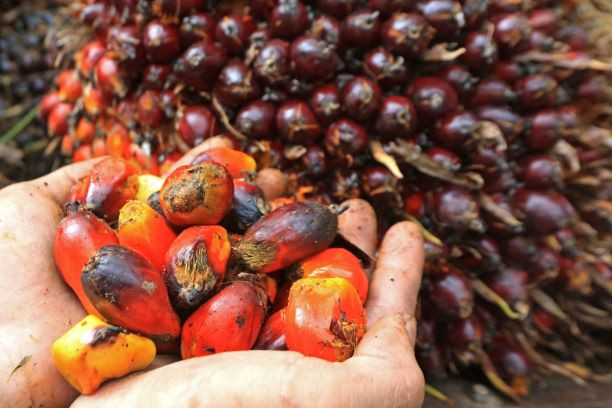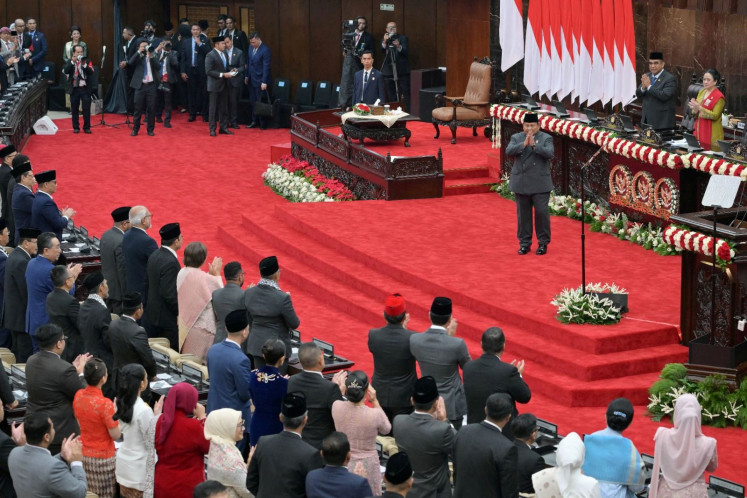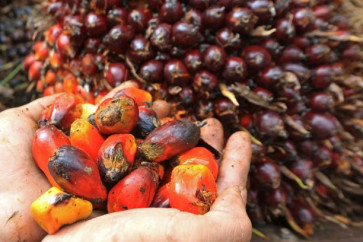Popular Reads
Top Results
Can't find what you're looking for?
View all search resultsPopular Reads
Top Results
Can't find what you're looking for?
View all search resultsStronger regulation for compulsory repatriation of export earnings
The heavy sanctions will be a strong deterrence for exporters looking to circumvent the regulation, unlike the previous regulation which imposed only fines on exporters that breached the policy.
Change text size
Gift Premium Articles
to Anyone
 Forbidden fruit: A worker displays oil palm fruits he has harvested in a plantation in Mesuji Raya village in the South Sumatra regency of Ogan Komering Ilir on April 29, 2023. Data show Indonesia exported 2.63 million tonnes of palm oil in February of this year, down from 3.09 tonnes the previous month.
(Antara/Budi Candra Setya)
Forbidden fruit: A worker displays oil palm fruits he has harvested in a plantation in Mesuji Raya village in the South Sumatra regency of Ogan Komering Ilir on April 29, 2023. Data show Indonesia exported 2.63 million tonnes of palm oil in February of this year, down from 3.09 tonnes the previous month.
(Antara/Budi Candra Setya)
The government will enforce a stronger regulation early next month to force companies exporting products based on mining, forestry, plantations and fisheries to repatriate and put a portion of their foreign exchange earnings in the domestic financial system.
Government Regulation (PP) No.36/2023, which replaces PP No. 1/2019 on the retention of forex export earnings within the domestic financial system, aims primarily to increase the forex market liquidity and to cope with the high fluctuations in capital flows. The new policy will be more effective in forcing the designated exporters to bring back home a portion of their forex earnings to increase the country’s forex reserves because the regulation is more specific about the minimum period of time and amount of forex earnings to be retained within the domestic financial system.
Exporters earning US$250,000 or more will be required to repatriate and put at least 30 percent of their export earnings in a special account at the appointed forex banks and the state-owned Export Financing Agency. This policy will not create shock as it is a common practice in many other emerging countries which are richly endowed with natural resources such as Turkey, Nigeria, India and Brazil.
Some of these countries once applied significantly higher portions of the earnings to be repatriated (sometimes up to 100 percent for up to nine months). Moreover, according to Bank Indonesia, 30 percent is the average percentage of the balance of export earnings brought back to Indonesia.
The new policy will also be more effective because it imposes heavier penalties, namely the suspension of export licenses, on exporters failing to comply with the regulation. The heavy sanctions will be a strong deterrence for exporters looking to circumvent the regulation, unlike the previous regulation which imposed only fines on exporters that breached the policy. Moreover, the administrative cost of calculating the amount of fines under the previous regulation was much higher.
Administering the fines for exporters who did not abide by the previous repatriation policy was costly because of the difficult and time-consuming process of verifying so many Export Customs Declarations (PPEs). For example, in 2022, only less than 10 percent were really paid out of a total of Rp 53 billion (US$3.52 million) in fines imposed on 216 exporters who did not repatriate and put their forex export earnings in special accounts at the appointed forex banks.


















